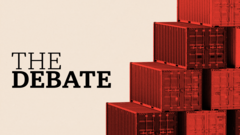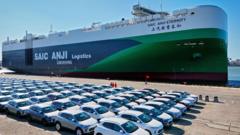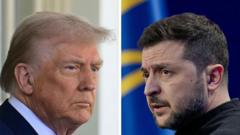In a debate between two economic experts, the consequences of President Trump's tariffs are evaluated, highlighting the potential risks and benefits to both the American economy and global trade dynamics.**
The Trade Transformation: Are Trump’s Tariffs a Threat to Global Free Trade?**

The Trade Transformation: Are Trump’s Tariffs a Threat to Global Free Trade?**
Exploring the implications of President Trump’s tariffs and the potential erosion of post-war trade norms in a rapidly changing economic landscape.**
President Trump's sweeping set of tariffs has set the stage for a contentious debate regarding the future of global trade. Designed to protect American industries and regain revenue, these tariffs target shifts in international trade dynamics, particularly focusing on China. With an initial 25% duty on steel and aluminum imports and additional threats aimed at Canada and Mexico, the potential consequences raise questions of whether we are witnessing the end of the post-war free trade consensus that has dominated since 1945.
Historically, tariffs have been linked to increased consumer prices, diminished choices, and have often led to retaliatory measures impacting the very industries they aim to protect. To delve deeper into these issues, a debate was held with two key economic scholars: Meredith Crowley of the University of Cambridge and Jeff Ferry from the Coalition for a Prosperous America. Both experts shared divergent views on the potential impact of Trump's tariff policies and the broader implications for both American society and the global economy.
According to Jeff Ferry, Trump perceives tariffs as vital tools for revitalizing the manufacturing sector in the U.S., particularly due to the significant trade deficit of $1.2 trillion recorded in 2024. He argues that tariffs can indeed bolster domestic production by compelling foreign competitors to invest in American industries. Meanwhile, Meredith Crowley cautions that such protective policies could disproportionately burden lower-income households, elevating prices for commonly purchased goods while failing to provide a straightforward solution to America's deindustrialization.
Ferry emphasized the historical economic realities, stating that the rise of China as a manufacturing powerhouse has fundamentally altered the landscape since its entry into the global marketplace in 2001. As nations consider retaliatory tariffs in response to U.S. measures, the prospects of an escalating trade war loom large. This potential conflict, according to Crowley, might undermine the very goals Trump sets out to achieve by thwarting economic growth in both the U.S. and its trade partners.
The discussion turned to the intricacies of consumer behavior and inflationary pressure, with Crowley noting that historical data suggests any price increases due to tariffs could exert a regressive impact on the poorest American consumers. The debate illuminated the complex relationships between globalization and domestic job security, highlighting the insufficient focus on effective industrial policies as opposed to blanket tariffs.
Through this debate, a shared concern emerged about the implications of returning to trade barriers reminiscent of protectionist policies of the past. Both experts acknowledged a need for a nuanced approach, offering differing opinions on the road forward. Crowley advocates for supportive industrial policies that target inequities wrought by globalization while Ferry remains firmly rooted in the belief that tariffs can level an uneven playing field and enable a revival of American manufacturing beneath a new trade paradigm.
The broader impact of such shifts may also reverberate globally, with fears that heightened trade tensions could adversely affect supply chains and the economic fortunes of developing nations reliant on trade with the U.S. As Trump navigates this contentious and evolving trade landscape, it poses critical questions about the future of economic cooperation and the legacy of post-war free trade norms. The next chapters of this economic saga will be watched closely as we ponder what comes next in an age of contentious trade battles.






















